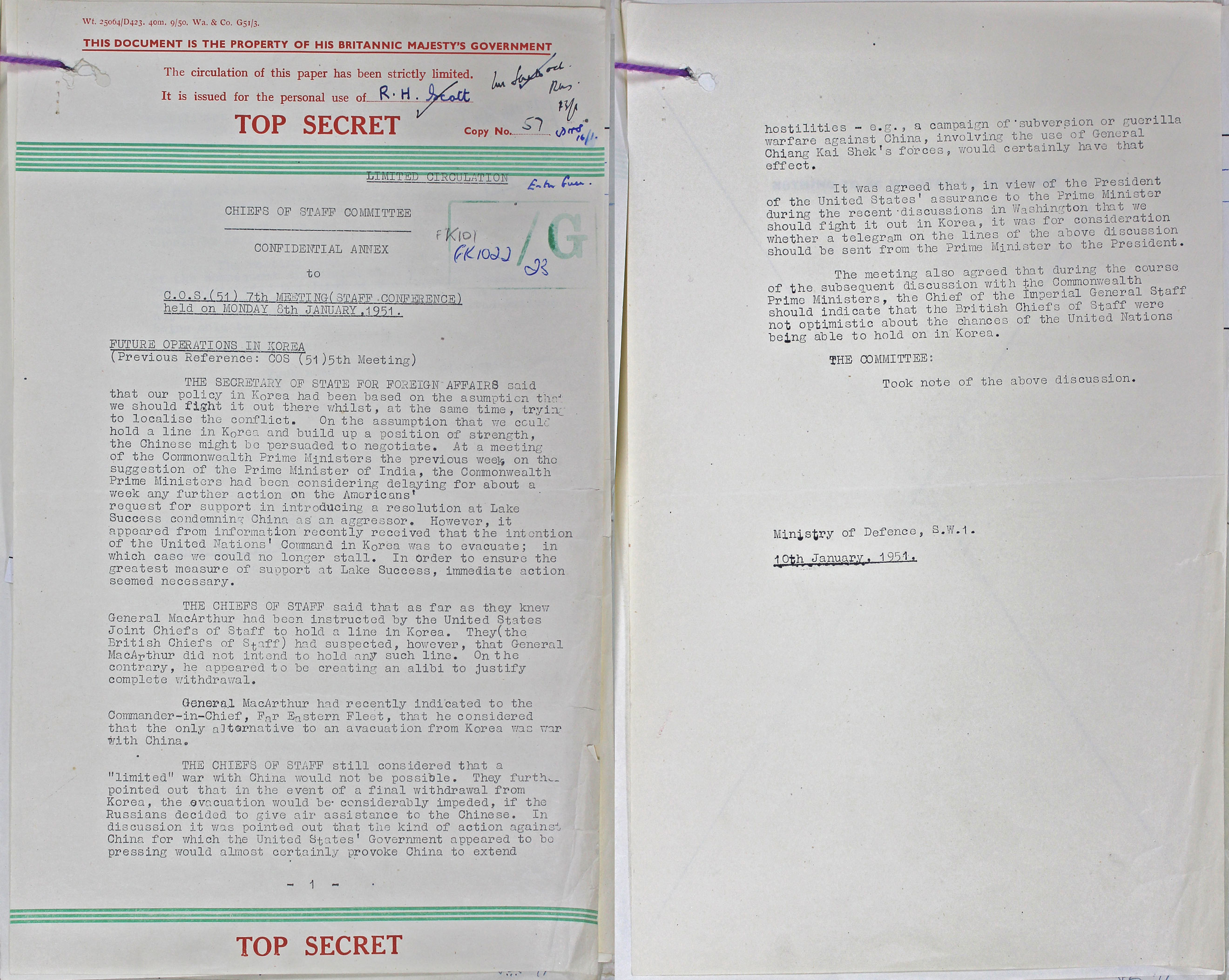
Notes from a meeting of Chiefs of Staff on policy in Korea, 8 January, 1951. (Catalogue ref: FO 371/92756)
Transcript
TOP SECRET
CHIEFS OF STAFF COMMITTEE
CONFIDENTIAL ANNEX
To
C.O.S. (51) 7TH MEETING (STAFF CONFERENCE)
Held on Monday 8th JANUARY, 1951.
FUTURE OPERATIONS IN KOREA
(Previous Reference: COS (51) 5th Meeting)
THE SECRETARY OF STATE FOR FOREIGN AFFAIRS said that our policy in Korea should be based on the assumption that we should fight it out there whilst, at the same time, trying to localise the conflict. On the assumption that we could hold a line in Korea and build up a position of strength, the Chinese might be persuaded to negotiate. At a meeting of the Commonwealth Prime Ministers the previous week on the suggestion of the Prime Minister of India, the Commonwealth Prime Ministers had been considering delaying for about a week any further action on the Americans’ request for support in introducing a resolution at Lake Success condemning China as an aggressor. However, it appeared from information recently received that the intention of the United Nations’ Command in Korea was to evacuate; in which case we could no longer stall. In order to ensure the greatest measure of support at Lake Success, immediate action seemed necessary.
THE CHIEFS OF STAFF said that as far they knew General MacArthur had been instructed by the United States Joint Chiefs of Staff to hold the line in Korea.
They (the British Chiefs of Staff) had suspected, however, that General MacArthur did not intend to hold any such line. On the contrary, he appeared to be creating an alibi to justify complete withdrawal.
General MacArthur had recently indicated to the Commander-in-Chief, Far East Fleet, that he considered the only alternative to the evacuation of Korea was war with China.
THE CHIEFS OF STAFF still considered that a “limited” war with China would not be possible. They further pointed out that in the event of a final withdrawal from Korea, the evacuation would be considerably impeded, if the Russians decided to give air assistance to the Chinese. In discussion it was pointed out that the kind of action against China for which the United States’ Government appeared to be pressing would almost certainly provoke China to extend hostilities- e.g., a campaign of subversion or guerrilla warfare against China, involving the use of General Chiang Kai Shek’s forces, would certainly have that effect.
It was agreed that, in view of the President of the United States’ assurance to the Prime Minister during the recent discussions in Washington that we should fight it out Korea, it was for consideration whether a telegram on the lines of the above discussion should be sent from the Prime Minister to the President.
The meeting also agreed that during the course of the subsequent discussion with the Commonwealth Prime Ministers, the Chiefs of the Imperial General Staff should indicate that the British Chiefs of Staff were not optimistic about the chances of the United Nations being able to hold on in Korea.
THE COMMITTEE
Took note of the discussion.
Ministry of Defence, S.W.1
10th January, 1951
